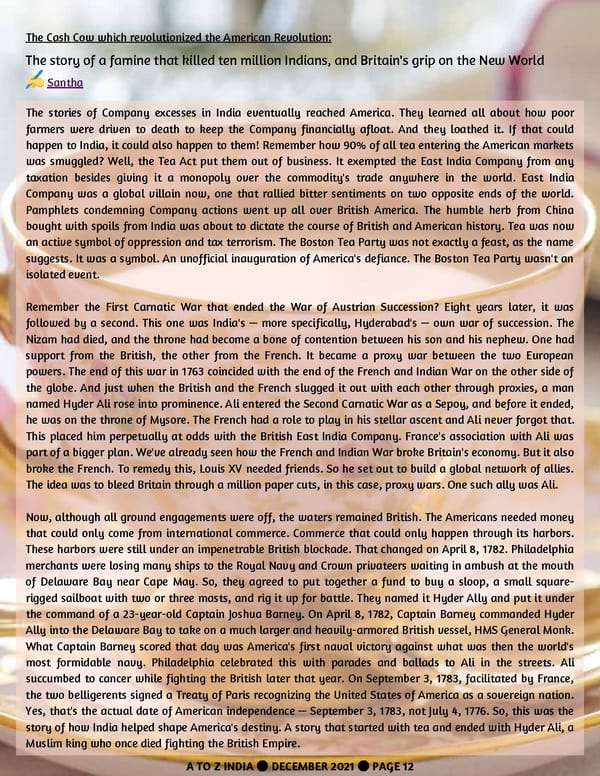The stories of Company excesses in India eventually reached America. They learned all about how poor farmers were driven to death to keep the Company financially afloat. And they loathed it. If that could happen to India, it could also happen to them! Remember how 90% of all tea entering the American markets was smuggled? Well, the Tea Act put them out of business. It exempted the East India Company f rom any taxation besides giving it a monopoly over the commodity's trade anywhere in the world. East India Company was a global villain now, one that rallied bitter sentiments on two opposite ends of the world. Pamphlets condemning Company actions went up all over British America. The humble herb from China bought with spoils from India was about to dictate the course of British and American history. Te a was now an active symbol of oppression and tax terrorism. The Boston Tea Party was not exactly a feast, as the name suggests. It was a symbol. An unofficial inauguration of America's defiance. The Boston Tea Party wasn't an isolated event. Remember the First Carnatic War that ended the War of Austrian Succession? Eight years later, it was followed by a second. This one was India's — more specifically, Hyderabad's — own war of succession. The Nizam had died, and the throne had become a bone of contention between his son and his nephew. One had support from the British, the other from the French. It became a proxy war between the two European powers. The end of this war in 1763 coincided with the end of the French and Indian War on the other side of the globe. And just when the British and the French slugged it out with each other through proxies, a man named Hyder Ali rose into prominence. Ali entered the Second Carnatic War as a Sepoy, and before it ended, he was on the throne of Mysore. The French had a role to play in his stellar ascent and Ali never forgot that. This placed him perpetually at odds with the British East India Company. France's association with Ali was part of a bigger plan. We 've already seen how the French and Indian War broke Britain's economy. But it also broke the French. To remedy this, Louis XV needed friends. So he set out to build a global network of allies. The idea was to bleed Britain through a million paper cuts, in this case, proxy wars. One such ally was Ali. Now, although all ground engagements were off, the waters remained British. The Americans needed mone y that could only come from international commerce. Commerce that could only happen through its harbors. These harbors were still under an impenetrable British blockade. That changed on April 8, 1782. Philadelphia merchants were losing many ships to the Royal Navy and Crown privateers waiting in ambush at the mouth of Delaware Bay near Cape May. So, they agreed to put together a fund to buy a sloop, a small square- rigged sailboat with two or three masts, and rig it up for battle. They named it Hyder Ally and put it under the command of a 23-year-old Captain Joshua Barney. On April 8, 1782, Captain Barney commanded Hyder Ally into the Delaware Bay to take on a much larger and heavily-armored British vessel, HMS General Monk. What Captain Barney scored that day was America's first naval victory agai nst what was then the world's most formidable navy. Philadelphia celebrated this with parades and ballads to Ali in the streets. Ali succumbed to cancer while fighting the British later that year. On September 3, 1783, facilitated by France, the two belligerents signed a Treaty of Paris recognizing the United States of America as a sovereign nation. Yes, that's the actual date of American independence — September 3, 1783, not July 4, 1776. So, this was the story of how India helped shape America's destiny. A story that started with tea and ended with Hyder Ali, a Muslim king who once died fighting the British Empire. The story of a famine that killed ten million Indians, and Britain's grip on the New World Santha The Cash Cow which revolutionized the American Revolution: A TO Z INDIA ● DECEMBER 2021 ● PAGE 12
 A TO Z INDIA - DECEMBER 2022 Page 11 Page 13
A TO Z INDIA - DECEMBER 2022 Page 11 Page 13